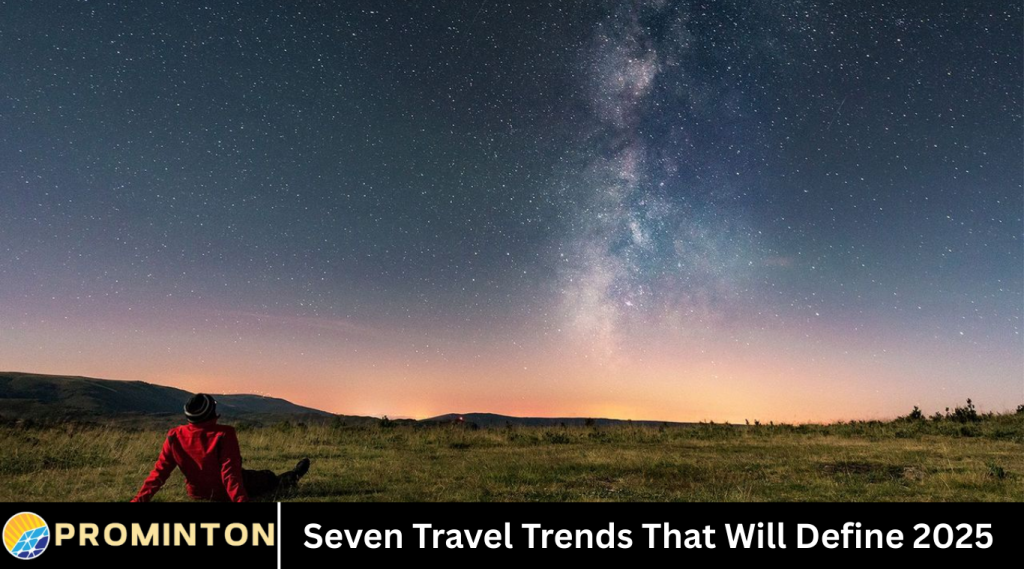Travel has always been a way for people to explore new places, experience different cultures, and take a break from daily life. As we move toward 2025, the world of travel is changing fast. New technologies, shifting values, and global events shape how and where people travel.
These changes are creating new trends that will define the travel experience in the coming years. In this article, we will explore seven important travel trends that will shape 2025. Understanding these trends can help travelers, businesses, and communities prepare for a future of travel that is more sustainable, connected, and meaningful.
The Rise of Sustainable Travel
Caring for the Planet
More travelers are becoming aware of the environmental impact of their journeys. Air travel, hotel stays, and activities can contribute to pollution and resource use. In 2025, sustainable travel will continue to grow as people choose options that reduce harm to the planet.
Eco-Friendly Accommodations and Transport
Hotels and resorts are adopting green practices like solar energy, water-saving systems, and waste reduction. Travelers will prefer transportation options like trains, electric cars, and bikes over airplanes and gas-powered vehicles for short distances.
Supporting Local Communities
Sustainable travel also means helping local economies and cultures. Travelers will seek experiences that support local artisans, farmers, and guides rather than large international corporations. This trend helps preserve cultural heritage and improve lives in tourist destinations.
Technology Enhancing Travel Experiences
Personalized Travel Planning
Technology will make travel planning easier and more personalized. Artificial intelligence (AI) and machine learning will suggest trips, hotels, and activities based on individual preferences and past behavior.
Virtual and Augmented Reality
Virtual reality (VR) and augmented reality (AR) will let travelers preview destinations or enjoy virtual tours from home. This helps people decide where to go or enhances their experience at the destination.
Smart Travel Devices
Wearable devices and smart luggage will improve convenience and safety. Features like GPS tracking, health monitoring, and automated check-ins will become common in 2025.
Health and Safety as Top Priorities
Post-Pandemic Travel Mindset
The COVID-19 pandemic changed how people think about health while traveling. Even in 2025, health and safety will remain top concerns.
Enhanced Hygiene Practices
Airports, hotels, and tour operators will maintain high hygiene standards. Contactless check-ins, digital boarding passes, and touch-free payments will be widely used.
Travel Insurance and Medical Support
More travelers will purchase comprehensive travel insurance that covers health emergencies and cancellations. Telemedicine services may become a part of travel support.
Rise of Slow Travel
Taking Time to Explore
Slow travel means spending more time in one place instead of rushing through many destinations. It encourages deeper connections with local culture and environment.
Longer Stays and Workcations
With remote work becoming common, travelers will stay longer in destinations, blending work and leisure. This trend supports local businesses and reduces the rush of tourists.
Sustainable Transportation
Slow travelers often use trains, buses, or bicycles instead of airplanes. This lowers carbon emissions and creates more meaningful travel experiences.
Increased Interest in Nature and Outdoor Activities
Nature as a Travel Destination
More people want to escape cities and connect with nature. National parks, forests, mountains, and beaches will see more visitors.
Adventure and Wellness Tourism
Travelers will seek activities like hiking, kayaking, yoga retreats, and spa visits that promote physical and mental health.
Conservation and Volunteer Tourism
Some travelers will choose trips that include volunteering for environmental projects or wildlife protection, combining travel with purpose.
Customized and Unique Experiences
Moving Beyond Traditional Tours
Travelers want more unique and authentic experiences rather than typical sightseeing. This includes cooking classes, cultural workshops, and local festivals.
Small Group and Private Travel
Small group tours and private guides will become popular to offer personalized attention and avoid crowds.
Experiential Travel
Travelers will focus on learning and personal growth, such as language immersion, art workshops, or spiritual retreats.
Flexible and Spontaneous Travel
Last-Minute Bookings
With better technology and fewer restrictions, travelers will book trips at the last minute, taking advantage of special deals and open schedules.
Multi-Destination Trips
Travelers will combine several places in one journey, exploring regions deeply and efficiently.
Adaptive Travel Plans
Travelers will stay flexible, ready to change plans based on weather, health advice, or new opportunities.
Frequently Asked Questions
What is sustainable travel and why is it important?
Sustainable travel means making choices that reduce harm to the environment and support local communities. It helps protect natural resources and preserves cultural heritage for future generations.
How is technology changing travel?
Technology is making travel easier, safer, and more personalized through tools like AI, virtual reality, and smart devices. It improves planning and enhances experiences.
Will health and safety concerns continue to affect travel after the pandemic?
Yes, travelers and the travel industry will keep focusing on hygiene, contactless services, and health support to protect people during their trips.
What is slow travel?
Slow travel involves spending more time in one place, connecting deeply with the local culture and environment. It often uses sustainable transportation and supports local businesses.
Why are more travelers interested in nature and outdoor activities?
Nature offers relaxation, adventure, and wellness benefits. Many people want to escape busy cities and enjoy natural beauty and healthy activities.
What kind of unique travel experiences are popular now?
Travelers seek authentic activities like cooking classes, cultural workshops, and private tours that provide personal growth and avoid crowds.
How is travel becoming more flexible and spontaneous?
Better technology and fewer restrictions allow travelers to book last minute, change plans easily, and explore multiple destinations in one trip.
Conclusion
The travel industry is evolving rapidly as new trends emerge to meet changing needs and values. Sustainable travel, advanced technology, health and safety, slow and nature-focused journeys, unique experiences, and flexible plans will define how people travel in 2025. These trends show a future where travel is more responsible, enjoyable, and meaningful.



